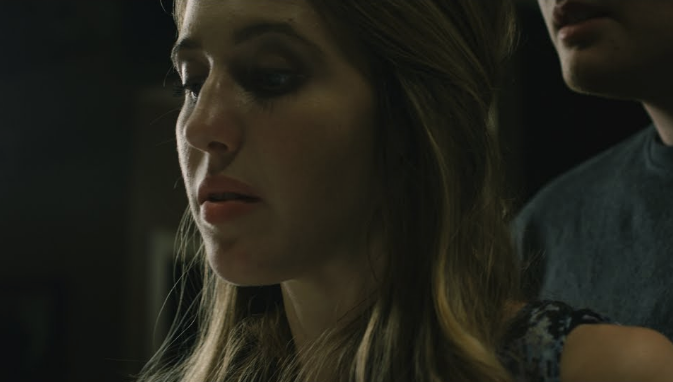Over Pressure, by Reed Lackey
22 Oct

In the realm of faith-based films, perhaps the least likely of sub-genres to encounter (second only to out-right horror) is the suspense thriller. The challenges in developing a compelling narrative while still making the film accessible to families are numerous. Tackling those challenges in his most recent film, Thy Neighbor, is director George A. Johnson, who has managed to craft a compelling and provocative suspense film, even if it does still succumb to some of the usual difficulties of both the suspense and faith-based genres.
Thy Neighbor begins with the arrival of Pastor Zach Reynolds, accompanied by his lovely wife Amber and their adolescent son Alex, to the new town in which he’ll be assuming leadership of the local church. From the very first moments of arrival (and literally the first scene), there is some curiosity and concern for their next-door neighbor. He seems reclusive and uneasy, and “Pastor Zach” (as he’s frequently referred to in the film, even by his wife) is determined to show him neighborly kindness and eventually save his soul. Even more devoted to that cause is Zach’s wife Amber, who defends the mandate to show neighborly kindness even when Zach begins to develop reservations about how much contact they should be having with the gentleman next door. Tensions escalate both within Zach’s family and within his church, which are either stemming directly from their secretive neighbor – or possibly from Pastor Zach himself.
There’s quite a bit to praise about Thy Neighbor. To begin with, the script wastes absolutely no space. Every scene pushes the story forward and there is not one bit of excess in the narrative rhythm. This does, however, mean that certain elements which could use a touch more subtlety or time to develop organically are given neither. The story isn’t really interested in anything that isn’t the story. While that gives the film an impressive level of focus, it also caused certain characters to feel a bit too under-developed and a few of their motivations felt either forced or obvious.
The biggest casualty of this focal choice is Pastor Zach himself (played by Nathan Clarkson), who feels awkwardly unbelievable as a pastoral figure. He uses the right language and carries the right demeanor, but it’s hard to buy in to his urgent devotion to certain ministerial duties (including the sacrificial hours he spends at church or his expressed concern for his congregants). Perhaps this is because we are never really given a moment to actively watch him be pastoral: we never hear him preach, except when he witnesses to his neighbor or discusses faith with his wife, and the few chances we have to see him with his parishioners are mostly overshadowed by the concerns related to the main story.
Regarding the elusive neighbor (who is never given a name – intentionally), his appearance and presence is unsettling almost from the first frame, thanks to a suitably off-kilter portrayal by relative newcomer Dave Payton. Every line he delivers seems to be both sinister and sympathetic, which would heighten the tension significantly in a more subtle presentation. As it stands, the viewer is rarely ever in doubt as to whether or not this neighbor should be trusted, which undermines certain choices the Reynolds family makes to try to be neighborly to him. In one particularly uncomfortable moment, the neighbor intrudes upon Amber while she is relaxing in a hot tub and eventually misinterprets her friendliness as an invitation to join her. This might have been presented as an outright dilemma if the neighbor weren’t so bluntly aggressive in his obvious infatuation with Amber.
And speaking of Amber, delivering one of the stronger performances in the film is Jessica Koloian, who carries a balanced mix of charm, trust, suspicion, and insecurity. She strikes nearly all of the right notes in her portrayal, and her relationship with Zach is one of the most believable elements of the film from her end, even when it is under strain by the narrative’s various threats. The only areas of her contribution to the story which stretch believability regard her apparent unwavering defense of their neighbor, despite the moments in which she is obviously made uncomfortable by his eccentricities. But both she and Zach’s trusts are each put through tumultuous conditions before the ultimate truths are finally unveiled.
This film is very interested in complicated issues, involving how to navigate trust and risk as Christian believers as well as how to balance relational sacrifices with the responsibilities of faithful witness. As such, it boldly pushes the boundaries of what would normally be considered fair game in a faith-based film, venturing into darker story elements and an alarmingly violent climax. Like all competent thrillers, it raises the stakes continually building up to some pretty alarming third-act revelations that I found genuinely impressive. This is to the film’s credit, as it displays a necessary push to address weightier elements of human relationships. But again, the unfortunate byproduct of the film’s direct focus is that its gravity is handled rather bluntly, resulting in a somewhat uneven takeaway. Like a submarine that dove too deep too quickly, the pressure of its directive threatens to collapse the whole ship.
But despite a decisive lack of nuance, and a somewhat troubling inference regarding the aftermath of domestic abuse, Thy Neighbor is a bolstering entry in the faith-based canon. It displays definitively that it is possible to venture into troubled waters and try to deal with complicated issues in a mature way. I wish that the film had chosen to explore its sandbox a bit more, allowing its characters more moments of development beyond the main plotline, but fans of suspense thrillers with a faith-based undertone should find the film both challenging and rewarding – despite its shortcomings – and should be encouraged to embrace it.
Thy Neighbor is currently streaming on Tubi.



No comments yet